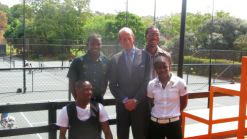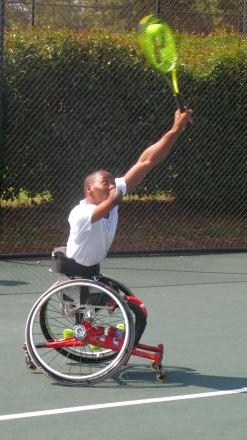
Prince meets SA’s tennis aces
A recent visit by royalty to a coaching clinic given by Wheelchair Tennis South Africa (WTSA) in Johannesburg served as affirmation and encouragement for the non-profit organisation’s continuing efforts to develop the sport and maintain its high standard. Prince Edward, the Duke of Kent, made a stop at the University of Johannesburg’s (UJ) athletics training grounds in the suburb […]


A recent visit by royalty to a coaching clinic given by Wheelchair Tennis South Africa (WTSA) in Johannesburg served as affirmation and encouragement for the non-profit organisation’s continuing efforts to develop the sport and maintain its high standard.
Prince Edward, the Duke of Kent, made a stop at the University of Johannesburg’s (UJ) athletics training grounds in the suburb of Westdene on Wednesday 10 October.
The Duke of Kent visited the facility in his capacity as president of the All England Lawn Tennis and Croquet Club, and his itinerary included a luncheon with the leadership of WTSA, some of the organisation’s most successful ambassadors – players Evans Maripa and Kgothatso Montjane – and Prof Ihron Rensburg, vice chancellor of UJ.
WTSA is a non-profit organisation offering development in the sport to deserving members of the disabled community. Promising players are sourced through schools, sports clubs and colleges across South Africa, and selections are done within a set of qualifying standards put in place by the body.
In need of support
Celia du Toit, chairperson of WTSA, expressed her gratitude to Prince Edward, who is Queen Elizabeth II’s first cousin, saying his visit is good for the sport’s image. She acknowledged that wheelchair tennis is a fairly new sport in South Africa, but it is growing.
“We are very grateful to our sponsor, the Airports Company of South Africa, for giving us international coverage,” Du Toit said, “but there is a need for sponsors to give the sport in general more coverage nationally.”

(Images: Ray Maota)
Ngasha Mahrankurwa, who competed in the London Paralympics as part of team Zimbabwe, is part of the coaching clinic at UJ. He was introduced to the sport, he told MediaclubSouthAfrica.com, by a coach he met in the street while still living in Zimbabwe.
Although he has been playing for five years, Mahrankurwa said the sport does not pay well, and this prevents him from taking it up on a full-time basis, even though he would like to.
“I need to sustain myself by working during the day and playing after hours,” said the 29-year-old, who is ranked 77th out of nearly 500 players worldwide.
International wheelchair tennis rankings are calculated by combining the points of the top nine tournaments for men, and top seven for women based on a 52-week roll-over period overseen by the International Tennis Federation.
Honing skills
Vice-chairperson of WTSA and performance coach Holger Losch has been involved in the administration of tennis for over 15 years. He has also played tennis for many years, and said there is little difference between coaching an able-bodied player like himself, and a disabled one.
“Coordination skills for disabled players take a while longer to hone, but if they are competitive and willing to work hard they quickly get the hang of it,” explained Losch.
In terms of the match rules, the only one difference is that in wheelchair tennis, players are allowed the option of two bounces before they have to hit the ball.
Losch said WTSA’s target is to host a minimum of six international events every year.
The cream of the crop
South Africa’s wheelchair tennis aces are top-ranked amongst the world’s players.
Lucas Sithole (25) is a triple amputee ranked number one in the country and sixth in the world in the quads division.
“Lucas has the perfect mind and body for tennis,” said Losch. “He is light, agile and uses his strengths to his advantage.”
The country’s top seed in the women’s division, Kgothatso Montjane, is also 25 years old and was born with a congenital birth defect. She is a single, below-the-knee amputee, and is ranked 13th in the world.
She maintains that no worthwhile journey is without challenges. “It is the rough road that ends in greatness.”
Twenty-one-year-old Evans Maripa is one of team South Africa’s youngest competitors. He is a double amputee ranked first the country’s singles division and 31st in the world.
“With the love I have for the game and the constant encouragement from friends, coaches and managers,” said Maripa, “I see myself as part of the winning team with WTSA.”
Source: www.mediaclubsouthafrica.com
